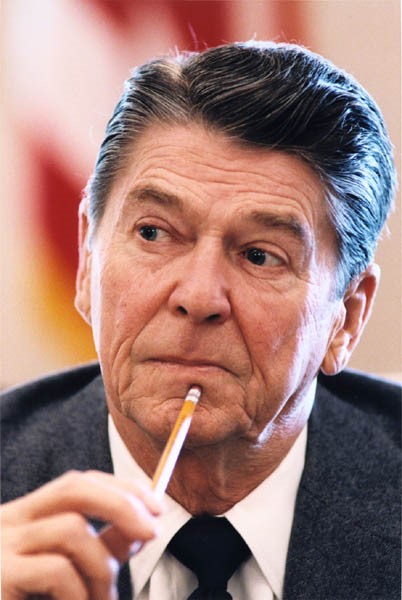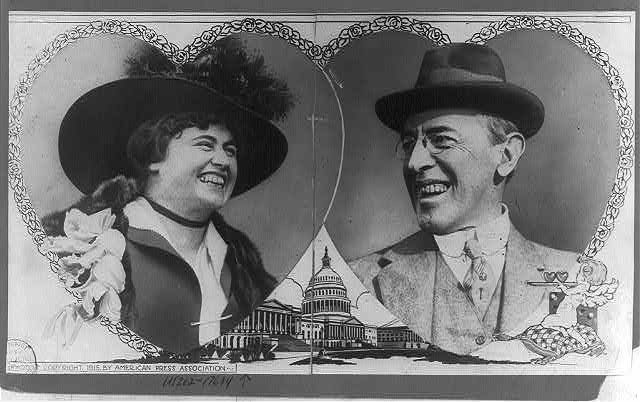 The missives of love and courtship collected in a president’s personal papers often reveal a more intimate, more tender side of their personalities than what is displayed in their often seemingly dispassionate official public personae.
The missives of love and courtship collected in a president’s personal papers often reveal a more intimate, more tender side of their personalities than what is displayed in their often seemingly dispassionate official public personae.
Here are a few collections of love letters of American presidents available at the UNT Libraries or on the Internet. Some of them were written before the author had become president, while others were written during the author’s presidential years.
The original spelling, grammar, and punctuation have been preserved in the excerpts presented below, although attention to such linguistic niceties often assumes a low priority in the heat of passion.
John Adams
My Dearest Friend: Letters of Abigail and John Adams, edited by Margaret A. Hogan and C. James Taylor
(Located in Willis Library, Third Floor, under call number E322 .A4 2007)
Correspondence Between John and Abigail Adams
(Available online at the Massachusetts Historical Society Web site)
John and Abigail Adams took pains to preserve the more than 1000 tenderly erudite letters they wrote to each other over a period of nearly forty years, making this one of the most remarkable collections of letters preserved from a presidential couple. Their love letters have assumed a classic status comparable to those of other famous couples of history such as Abelard and Heloise or Elizabeth and Robert Browning, and served as the basis for a romantic subplot in the musical 1776.
O my dear Friend do you know how I feel when I look Back upon a long absence. I look forward with the Thought that the year is but half spent. I often recollect those lines “O ye Gods annialate but time and Space, and make two Lovers happy.“
By the same Token that the Bearer hereof satt up with you last night I hereby order you to give him, as many Kisses, and as many Hours of your Company after 9 O’Clock as he shall please to Demand and charge them to my Account: This Order, or Requisition call it which you will is in Consideration of a similar order Upon Aurelia for the like favour, and I presume I have good Right to draw upon you for the Kisses as I have given two or three Millions at least, when one has been received, and of Consequence the Account between us is immensely in favour of yours,
John Adams
Woodrow Wilson
The Priceless Gift: The Love Letters of Woodrow Wilson and Ellen Axson Wilson, edited by Eleanor Wilson McAdoo
(Request from Remote Storage)
Woodrow Wilson, who often appeared austere and aloof in public, wrote thousands of effusive love letters to his first wife, Ellen Axson, before and during their marriage.
I long to be made your master—only however, on the very fair and equal terms that, in exchange for the authority over yourself which you relinquish, you shall be constituted supreme mistress of me.
…and then I come myself, to claim you, to take possession of you,—of all the time and love you can give me: to take you in my arms and hold you till I have made sure, by feeling your heart beat against mine and by seeing once more the very depths of your eyes, that I am really at home once more, with the woman who has made me and kept me what I am. I tremble with a deep excitement when I think of it. I verily believe I never quivered so before with eager impatience and anticipation. I know that I was not half so much excited on the eve of our marriage.
Are you prepared for the storm of love making with which you will be assailed?
Wilson also had an extramarital affair with Mary Peck, a divorcee he had met while vacationing in Bermuda. He wrote her dozens of love letters. There were rumors that the affair might interfere with his aspirations for the presidency, but his opponent Theodore Roosevelt dismissed this possibility, commenting that “You can’t cast a man as a Romeo when he looks and acts so much like an apothecary’s clerk.”

A President in Love: The Courtship Letters of Woodrow Wilson and Edith Bolling Galt, edited by Edwin Tribble
(Located in Willis Library, Third Floor, under call number E767 .W837 1981)
There was speculation that they Wilson and Peck might marry after Ellen died in 1914 of kidney disease, but eight months after Ellen’s death he met Edith Bolling Galt, who had lost her first husband in 1908. Their meetings were chaperoned, but Wilson wooed her ardently, sending her flowers and writing hundreds of passionate love letters, sometimes signing them “Tiger.” In spite of the potential risk to his political career, Wilson proposed, and within 15 months after his first wife’s death he was remarried. Meanwhile, the Washington Post printed an infamous typo, announcing that “The President gave himself up for the time being to entering his fiancée.” (Presumably they meant “entertaining.”)
You are more wonderful and lovely in my eyes than you ever were before; and my pride and joy and gratitude that you should love me with such a perfect love are beyond all expression, except in some great poem which I cannot write.
Please go to ride with us this evening, precious little girl, so that I can whisper something in your ear—something of my happiness and love, and accept this, in the meantime, as a piece out of my very heart, which is all yours but cannot be sent as I wish to send it by letter.
Warren G. Harding
Warren G. Harding–Carrie Fulton Phillips Correspondence
(Available online at the Library of Congress Digital Collections Web page)
In 1964, while researching his 1968 biography In the Shadow of Blooming Grove: Warren G. Harding and His Presidency, historian Francis Russell discovered a stash of over 100 letters written to his mistress of 15 years, Carrie Phillips. Harding’s heirs successfully sued to have the letters sealed from the public for 50 years, so they were not included in Russell’s book, but they were finally released to public view and posted online by the Library of Congress in 2014. Most of the letters that have been preserved were written by Harding, but some of the drafts and notes for Phillips’ side of the correspondence have also been preserved.
By the time Harding was elected president their literary correspondence seems to have stopped, but some of the letters were written while he was a U.S. senator, many of them written on senate stationery. They invented a private code in case any letters might be intercepted. Harding referred to his male member as “Jerry” and his mistress’ female parts as “Mrs. Pouterson.” Phillips was enamored of German culture and allegedly threated to reveal their affair if Harding ever voted in favor of going to war with Germany during World War I. He did; she didn’t.
There are no words at my command sufficient to say the full extent of my love for you — a mad, tender, devoted, ardent, eager, passion-wild, jealous, reverent, wistful, hungry, happy love — unspeakably encompassing, immeasurably absorbing, unendingly worshipping, unceasingly exalting, unwillingly exacting, involuntarily excluding, everlastingly compensating.
I suppose you think it a crime to utter a word of love. Maybe you can’t — truthfully. Still, when I saw Mrs. Pouterson, a month ago, she persuaded me you still loved. I had a really happy day with her.
Wish I could take you to Mount Jerry. Wonderful spot. Not in the geographies but a heavenly place, and I have seen some passing views there and reveled in them. Gee! How I wish you might be along.
Harding also fancied himself something of a poet:
I love your poise
Of perfect thighs
When they hold me
in paradise . . .
I love the rose
Your garden grows
Love seashell pink
That over it glows
Lyndon Baines Johnson
Dear Bird: The 1934 Courtship Letters
Available online at the LBJ Presidential Library Web site
Lyndon Baines Johnson and Claudia Alta “Lady Bird” Taylor were introduced on September 5, 1934, and by the end of the following day he had allegedly proposed marriage. She was not quite as impetuous, however, and the two corresponded for the next ten weeks before he finally won her over, and on November 14, 1934 they, as Lady Bird put it, “committed matrimony.”
The nearly 90 letters that they wrote during their courtship in 1934 have been digitized and made available on the LBJ Presidential Library Web site. These are part of a larger collection of digitized correspondence between LBJ and Lady Bird that spans the years from 1934 through 1968.
Have been intending to tell you everyday about a little orange comb I carry in my billfold. It is the only thing I have from my little girl at Karnack and when I get lonesome and blue or happy and ambitious I always get pleasure when I look at the little comb and think…just think.
Again I repeat—I love you—only you. Want to always love—only you. It is an important decision. It isn’t being made in one night—it probably never will be yours—but your lack of decision hasn’t tempered either my affection, devotion or ability to know what I want. I don’t want to go on this way. Do you? Will you tell me? Give me lots of letters next week. I’m going to need them. Mix some “I love you” in the lines and not between them.
Write me that long letter. Tell me just how you feel — give me some reassurance if you can and if you can’t let’s understand each other now. I’m lonesome. I’m disappointed but what of it. Do you care?
Ronald Reagan
I Love You, Ronnie: The Letters of Ronald Reagan to Nancy Reagan
(Located on the Third Floor of Willis Library under call number E877 .A4 2000)
Nancy Reagan collected her husband’s love letters and mash notes—often decorated with romantic doodles such as hearts, arrows, or happy faces—and incorporated them into a personal account of their romance, which had lasted half a decade.
Ronald affectionately referred to Nancy by such pet names as “Nancy Pants” or “Mommy Poo Pants,” and sometimes signed his letters with equally whimsical appellations, such as “Your In Luv Gov” or “Daddy Poo Pants.”
What do you say about someone who’s always there with support and understanding, someone who makes sacrifices so that your life will be easier and more successful? Well, what you say is that you love that person and treasure her.
Without you there would be no sun, no moon, no stars. With you, they are all out at the same time.
We are so much “one” that you are as vital to me as my own heart—with one exception; you could never be replaced with a transplant.
Feb. 14 may be the date they observe and call Valentine’s Day but that is for people of only ordinary luck. I happen to have a “Valentine’s life” which started on March 4, 1952 and will continue as long as I have you.
Article by Bobby Griffith
Photo of Ronald Reagan courtesy of the Ronald Reagan Presidential Library.
Photo of Woodrow Wilson and Edith Bolling Galt copyright 1915 by American Press Association.


